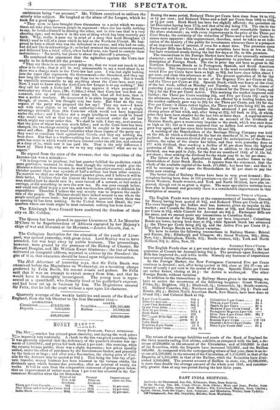The usual weekly meeting of the Anti-Corn-law League in the
Man- chester Corn Exchange was much crowded on Thursday evening; the attraction of the night being an address from Mr. Charles Villiers. Mr. Mark Philips, Mr. Cobden, Mr. Brotherton, and the, usual leaders of the League, were in attendance. A long report was read of contribu- tions from many towns, ranging from 21. 10s. to 3001. ; many of the
eminences being "on account." Mr. Villiers contrived to enliven the utterly trite subject. He laughed at the abuse of the League, which he took for a good sign- " They seem to have brought these discussions to a point which we some- times see take place between people in argument : when one has really nothing
to say, be betakes himself to abusing the other and in this case that is a very
cheering sign; and we have it in the sort of thing which has been recently put forth. Why, really, it puts me in mind of a story that Lord Brougham (I
think) used to tell, of a cause which he had on the Northern Circuit. He hap- pened to have a client who was the defendant in a cause, and who had no case, but did not like to acknowledge it ; so he had retained the most eminent counsel, and delivered him a brief, which, when looked into, was found to contain these
instructions No merits, but please to abuse the plaintiff's attorney.'"
He combated the argument that the agitation against the Corn-law ought to be deferred for the present— "They say there is an experiment going on; that we must not touch it, but allow it to work ; that it will be very unreasonable to say a word about it, as there was a change made in the Corn-law last year. I was last night looking into the paper that represents the Government—the Standard, and they say how long the trial is to last—they say from ten to twelve years. But it would be especially unreasonable to say anything about the Corn-laws next year. Now, I want to know why the Anti-Corn-law League is to say nothing? Did they call for such a Corn-law ? Did they approve it when proposed ? 1 remember my friend here, (Mr. Cobden,) when that Corn-law was first an- bounced, rose up and uttered what many felt, what all feel here, that it was a perfect mockery. He denounced it in plain language to the House ; though, of course, it was thought very ban taste. But what do the very organs of the party who proposed the law say ? They say now—I know not with what object, or on what authority—that there is not a single advantage derivable from this Corn-law which would not have happened under the other; and I believe not a single intelligent man could be found who would not tell us that not one evil bad occurred under the old law which might not occur under this. We shall be told, 1 dare say, next session, that the price of wheat has very much fallen ; and as the Corn-laws has been changed, the two things existing together will be sought to be connected as cause and effect. But we must remember what these organs of the party say : they want to conciliate their agricultural friends, and they say nothing has been done. But that is a truth—nothing has been done ; not one particle of grain has come in which would not have entered under the old law, and entered at a duty of ls., while now it has paid 18s. That is the only difference I know of. Then I say, why are we to try any experiment ? what are we to He He argued from the state of the revenue, that the imposition of the Income-tax was a mistake- " It is dangerous to prophesy, but last quarter fulfilled the prediction which some gentlemen ventured to make, that though the returns might give the Minister a direct tax from income, be would lose from other sources ; and in the October quarter there was upwards of half a million lost from other sources. To-morrow we shall see what the present quarter gives, and I believe it will be little better. 1 believe that the instant the Income-tax was announced every span studied how be should save it ; some turned off a servant, or laid aside a carriage, or did something to save the new tax. He was poor enough before, and could not afford to pay a new tax, and was Therefore obliged to diminish his expenditure. Therefore I believe the real remedy was to improve the condi- tion of the people. The Minister should have looked around to see where the people could get more trade: but precisely in those quarters where there was an opening he has done nothing. In the United States and Brazil, the two quarters where our trade might be most extended, nothing has been done."
The Edinburgh Town Council have conferred the freedom of their city on Mr. Cobden.































 Previous page
Previous page